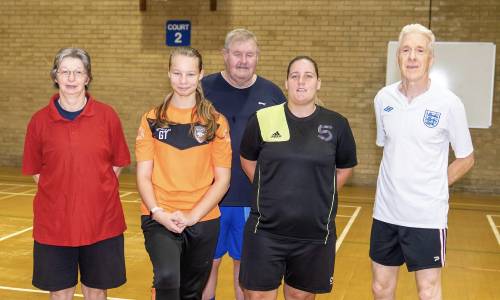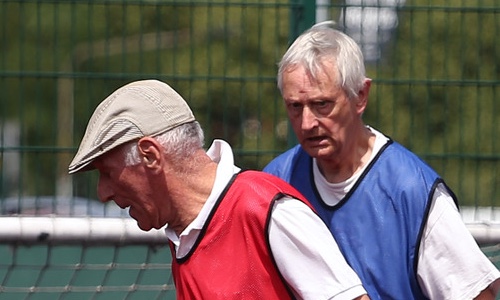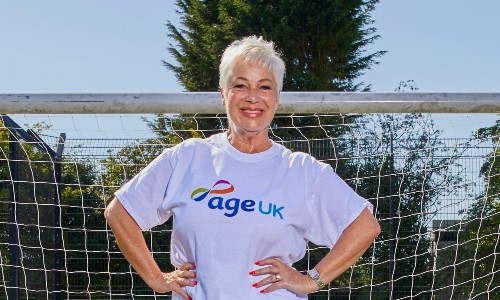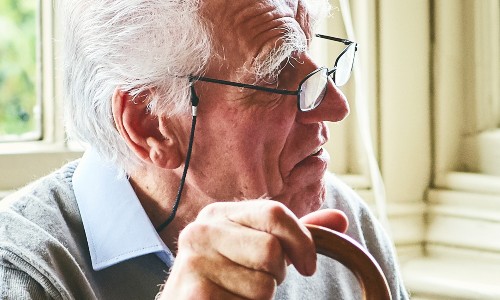While almost all of us experience loneliness at some point in our lives, for many, those feelings persist, undermining wellbeing and negatively impacting quality of life.
While Age UK's services have long offered a lifeline for those struggling with feelings of loneliness, we're always looking for new ways to combat the issue in communities across the country.
A special fixture
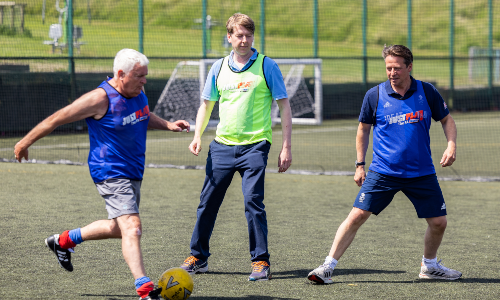 Last week, during Loneliness Awareness Week, Nigel Huddleston, the Minister responsible for tackling the loneliness agenda, and Robin Walker, MP for Worcester, visited Age UK Herefordshire and Worcestershire, a participant in the Age UK Walking Football Programme. There, both got to see first-hand how the beautiful game is helping with feelings of loneliness.
Last week, during Loneliness Awareness Week, Nigel Huddleston, the Minister responsible for tackling the loneliness agenda, and Robin Walker, MP for Worcester, visited Age UK Herefordshire and Worcestershire, a participant in the Age UK Walking Football Programme. There, both got to see first-hand how the beautiful game is helping with feelings of loneliness.
“It’s important as you get older and retire to stay active and at events like this, you meet loads of new people and make new friends,” says Gary, 70, one of the participants. There are lots of people like Gary who could benefit from meeting new friends because, as Age UK analysis shows:
- Before the pandemic 225,000 older people often went a week without speaking to anyone
- During the height of the pandemic, 1.2 million older people across the UK said that they often felt lonely
- And even though life feels like it’s getting back to normal for many of us, 27% say they speak to their family less now than before the start of the pandemic.
Benefits of The Beautiful Game
The Age UK Walking Football Programme is changing the lives of people like Gary and the scores of others lacing up their boots. The programme has reached more than 1,400 older people, with 70% of players feeling that the game has improved their mental health. Meanwhile, 81% of players also reported that walking football has improved their physical health.
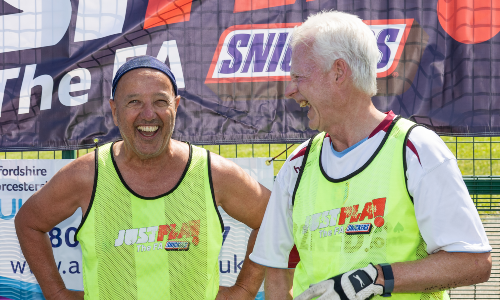 We also know that physical activity helps us stay stronger and steadier on our feet as we get older. Physical activity, such as walking football, is proven to contribute to increased physical function, helps people live independently for longer, and improves quality of life in healthy older adults as well as those with long-term health conditions. There is also evidence being more active can lower the risk of depression as well as conditions such as dementia, heart disease, stroke, Parkinson’s and some cancers.
We also know that physical activity helps us stay stronger and steadier on our feet as we get older. Physical activity, such as walking football, is proven to contribute to increased physical function, helps people live independently for longer, and improves quality of life in healthy older adults as well as those with long-term health conditions. There is also evidence being more active can lower the risk of depression as well as conditions such as dementia, heart disease, stroke, Parkinson’s and some cancers.
“As you get older, you’ve got to use it or lose it,” suggests Richard, 67. “It’s inspired me to get fitter.”
As well as all these health benefits, what the players such as Gary and Richard and their teammates at Age UK Herefordshire and Worcestershire really enjoy is simply having a kick about. It helps foster friendships, provides a sense of purpose and routine and, of course, allows one team bragging rights until the next match.
Working together as a team
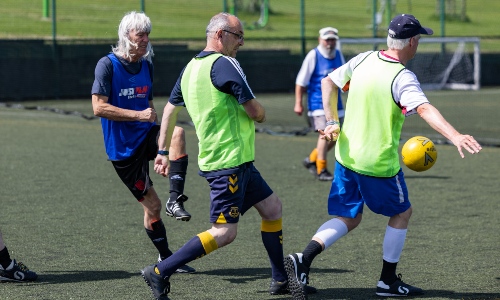 “I’ve made new friends and gotten to know more people,” adds Richard. “We all stop for a coffee after and have a chat. For those who are getting on or may have lost a partner, it helps with socialising. If someone doesn’t turn up for a few weeks, we reach out on our WhatsApp group.”
“I’ve made new friends and gotten to know more people,” adds Richard. “We all stop for a coffee after and have a chat. For those who are getting on or may have lost a partner, it helps with socialising. If someone doesn’t turn up for a few weeks, we reach out on our WhatsApp group.”
But with so many older people feeling lonely, Age UK wants to see services like walking football made available to more older people across the country. “Age UK’s Walking Football Programme is a fantastic way for communities to come together and tackle loneliness,” the Minister said of the programme during his visit. “It was great to see its inspiring work helping older people make new friends while having fun and getting exercise.”
The Age UK Walking Football Programme
The Football Association, Sport England and Age UK have announced a walking football programme, with the goal of reaching more than 1,000 older people in communities across England.


